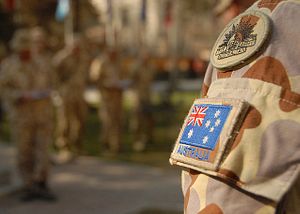Some American strategists have of late expressed the concern that the United States’ growing military ties with various nations in East and Southeast Asia give these nations a finger on the American trigger. That is, actions these nations may take on their own could involve the United States in a war with North Korea, Russia or China. This issue has been particularly raised with regard to Japan because the U.S. has declared that it views the Senkaku/Diaoyu Islands as if they were parts of Japan – which the United States is committed by treaty to defend.
Now, a former Australian prime minister, Malcolm Fraser, turns the tables on this concern in an important article in the most recent issue of The National Interest. Fraser fears not that Australia will drag the United States into war, but rather that the United States will involve Australia in a war not of Australia’s making.
Fraser goes so far as to label the United States a “dangerous ally” because since the fall of the USSR Australia has “become progressively more enmeshed in American strategic and military affairs,” such that it is effectively no longer capable of making its own military decisions. He is particularly concerned by the possibility that the United States could launch military attacks from bases located on Australian territory but Australia would be given no opportunity to oppose the United States’ decisions. In short, Australia has “effectively ceded to America the ability to decide when Australia goes to war.”
Moreover, the United States’ sense of exceptionalism and its cultural insensitivity trouble Fraser. As he sees it, these qualities have caused the United States to antagonize China and Russia and have let the U.S. irresponsibly engage in armed conflicts in the Middle East. Fraser sees the conflict in Ukraine in part as a result of Washington’s attempt to include Ukraine in NATO – demonstrating a “marked lack of historical understanding” about Russia.
To rectify the situation, Fraser suggests that the U.S. remove its military facilities from Darwin and Pine Gap as soon as logistically possible. He also recommends that Australia shore up its diplomatic activities throughout East and Southeast Asia and at the United Nations, as well as increasing Australia’s defense spending to three percent of GDP.
All of this is important because the United States has in the last few years followed a “burden sharing” policy. It has called on allies to pick up part of the tab for the military buildup to “balance” China as well as Russia. (Indeed, some military planners favor a division of labor in which allies assume responsibility for one or more specific missions.) Such burden sharing is viewed as a way of responding to domestic pressures to keep its defense budget low. Moreover, including other nations in its various coalitions of the willing enhances the legitimacy of the United States’ military operations. For example, to fight ISIS – a force estimated at most to include 32,000 fighters – the U.S. assembled a coalition of sixty countries, many of which were included not because of their military capabilities but rather because they added legitimacy to the operation. In addition, the United States views establishing military partnerships with other nations as a way to contain China – although officials avoid the term “contain” because it smacks of the Cold War era and its tensions.
Critics of this approach – Fraser is far from the only one – worry that the nations with which the United States has established ties will come to view the United States’ statements as full-fledged commitments to come to their defense in the event of an attack. These nations should learn from Ukraine’s experience: When Ukraine relinquished its nuclear weapons, the U.S. gave it “security assurances” in what is known as the Budapest Memorandum. As Steven Pifer at Brookings noted, in 1994 these security assurances were “a check for U.S. support – albeit one the United States hoped would never be cashed.” However, when Russia used its armed forces to grab parts of Ukraine and to threaten others, these assurances turned out not to provide much of a deterrence. After all, as one lawyer explained privately, these were merely assurances, not guaranties.
All this suggests that although Fraser’s assertion that the United States is a “dangerous ally” is unnecessarily provocative, the issues he raises surely deserve much attention. Military alliances seem attractive for various reasons already listed. One should, though, not ignore that they are also risky – for all involved.
Amitai Etzioni is a professor of international relations at The George Washington University. His latest book, The New Normal, was released in November by Transaction Publishers. Follow him on Twitter, Facebook, and YouTube, or send an email to [email protected] to subscribe to his monthly newsletter.

































